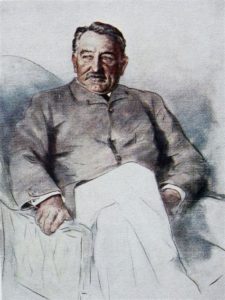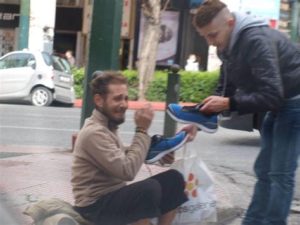‘And I will say to my soul, “Soul, you have many goods laid up for many years to come; take your ease, eat, drink and be merry.”‘ Luke 12:19
 It seems that the ability in this day and age to record video on our phones and send it instantly around the world has changed how we intervene in difficult situations. The other day I saw a store video of man who had a heart attack and the car he was driving careened through the front doors of a store. Before the car even reached the glass there were people with their phones out recording the whole thing. When the car finally came to a halt with the man slumped over the wheel there were four people with their phones pointed toward the car and none of them made a move to help the driver. I am sure they eventually did, but not before they got video evidence that they could send to friends or news media or TMZ. Their first instinct wasn’t to help, but to record. That inward desire to help those in need might be on the decrease in the world, but it should not be that way for the church.
It seems that the ability in this day and age to record video on our phones and send it instantly around the world has changed how we intervene in difficult situations. The other day I saw a store video of man who had a heart attack and the car he was driving careened through the front doors of a store. Before the car even reached the glass there were people with their phones out recording the whole thing. When the car finally came to a halt with the man slumped over the wheel there were four people with their phones pointed toward the car and none of them made a move to help the driver. I am sure they eventually did, but not before they got video evidence that they could send to friends or news media or TMZ. Their first instinct wasn’t to help, but to record. That inward desire to help those in need might be on the decrease in the world, but it should not be that way for the church.
Apathy is defined as absence or suppression of passion, emotion, or excitement or a lack of interest in or concern for things that others find moving or exciting. It is indifference to others concerns or needs. It is the opposite of empathy which is the act of deeply identifying with someone else’s feelings or needs. They say that when a husband feels sympathy for his wife’s uncomfortable pregnancy, he feels sorry for her. When he has empathy, he gets morning sickness as well! We live in an every increasing place of apathy rather than empathy. Stories like the one above are becoming the norm, not the exception. But that should not be the church. We should, at the least, be the last bastion of concern for others in a world that promotes concern for self. Not only should we be quick to help in specific times of need, we should not be hesitant to step out to a hurting world with our good news of the healing Christ.
excitement or a lack of interest in or concern for things that others find moving or exciting. It is indifference to others concerns or needs. It is the opposite of empathy which is the act of deeply identifying with someone else’s feelings or needs. They say that when a husband feels sympathy for his wife’s uncomfortable pregnancy, he feels sorry for her. When he has empathy, he gets morning sickness as well! We live in an every increasing place of apathy rather than empathy. Stories like the one above are becoming the norm, not the exception. But that should not be the church. We should, at the least, be the last bastion of concern for others in a world that promotes concern for self. Not only should we be quick to help in specific times of need, we should not be hesitant to step out to a hurting world with our good news of the healing Christ.
 Even though the word empathy or its Greek equivalent cannot be found in the New Testament, the idea of empathy can be found many places. The apostle Peter counseled Christians to have “compassion for one another; love as brothers, be tenderhearted, be courteous . . .” (1 Peter 3:8) and the apostle Paul recommended similar sentiments when he exhorted fellow Christians to “rejoice with those who rejoice, and weep with those who weep” (Romans 12:15). No one should have a more deep-seated concern for others than the Body of Christ. Jesus showed more empathy on our behalf than anyone who has ever lived and we need to convey that sacrificial heart to those around us by the way we live. Our call in God’s Word is to be called to empathy, not apathy, yet even in the church, apathy is beginning to rear its ugly head.
Even though the word empathy or its Greek equivalent cannot be found in the New Testament, the idea of empathy can be found many places. The apostle Peter counseled Christians to have “compassion for one another; love as brothers, be tenderhearted, be courteous . . .” (1 Peter 3:8) and the apostle Paul recommended similar sentiments when he exhorted fellow Christians to “rejoice with those who rejoice, and weep with those who weep” (Romans 12:15). No one should have a more deep-seated concern for others than the Body of Christ. Jesus showed more empathy on our behalf than anyone who has ever lived and we need to convey that sacrificial heart to those around us by the way we live. Our call in God’s Word is to be called to empathy, not apathy, yet even in the church, apathy is beginning to rear its ugly head.
I once asked a student what apathy was and he said, “I don’t know, and I don’t care.”  He was kidding, but it was almost a perfect definition! I once heard that the nice thing about apathy is you don’t have to exert yourself to show you’re sincere about it. Unfortunately, there are many today that are especially sincere about their apathy. As we look at the growing crises around us, we can’t allow ourselves to be hardened to the to the point that we don’t notice the needs. I heard about a company that recently came out with blank bumper stickers. They were for people who don’t want to get involved! Well, that cannot be us. We need to be involved because we have a message of love that the world needs. If not, the penalty we pay for not being involved in the things of this world will be that the world will be governed by those who don’t love. It would be careless for us to allow the world to be run by those who care less.
He was kidding, but it was almost a perfect definition! I once heard that the nice thing about apathy is you don’t have to exert yourself to show you’re sincere about it. Unfortunately, there are many today that are especially sincere about their apathy. As we look at the growing crises around us, we can’t allow ourselves to be hardened to the to the point that we don’t notice the needs. I heard about a company that recently came out with blank bumper stickers. They were for people who don’t want to get involved! Well, that cannot be us. We need to be involved because we have a message of love that the world needs. If not, the penalty we pay for not being involved in the things of this world will be that the world will be governed by those who don’t love. It would be careless for us to allow the world to be run by those who care less.
 We should be the first to come to those in need. Whether it is friend who is distraught or the co-worker who feels caught, we must read the feelings around us and be ready to respond. John told us that, “Whoever has this world’s goods, and sees his brother in need, and shuts up his heart from him, how does the love of God abide in him?” (1 John 3:17) We must look for opportunities to intentionally show love to one another. Apathy blinds us, but empathy enlightens us. Others pain or distress or dilemma should be the impetus for us to spring into action. Jesus said that the second of the great commandments after loving God is to “Love your neighbor as yourself.” (Matthew 22:39) That doesn’t sound like apathy, but empathy. Peter reiterates this in his book when he says, “Above all, maintain an intense love for each other, since love covers a multitude of sins.” (1 Peter 4:8) Empathy should be the glasses that we look at others through. If we do that, it will free us up to love as the Bible instructs. Someone once said that empathy is your pain in my heart. How apt a notion.
We should be the first to come to those in need. Whether it is friend who is distraught or the co-worker who feels caught, we must read the feelings around us and be ready to respond. John told us that, “Whoever has this world’s goods, and sees his brother in need, and shuts up his heart from him, how does the love of God abide in him?” (1 John 3:17) We must look for opportunities to intentionally show love to one another. Apathy blinds us, but empathy enlightens us. Others pain or distress or dilemma should be the impetus for us to spring into action. Jesus said that the second of the great commandments after loving God is to “Love your neighbor as yourself.” (Matthew 22:39) That doesn’t sound like apathy, but empathy. Peter reiterates this in his book when he says, “Above all, maintain an intense love for each other, since love covers a multitude of sins.” (1 Peter 4:8) Empathy should be the glasses that we look at others through. If we do that, it will free us up to love as the Bible instructs. Someone once said that empathy is your pain in my heart. How apt a notion.
Years ago a very rich and influential man by the name of Cecil Rhodes threw a gala event to which he invited a young man. Cecil Rhodes, whose fortune would eventually endow the famous Rhodes Scholarship, was a stickler for proper dress at these events. Strangely, he disappeared shortly before the banquet began. The young man who had been invited came straight from the train station and was embarrassed about his appearance. He was in total disarray, yet he was surrounded by the most finely dressed people in the city. Cecil Rhodes, reappeared after his untimely dissappearance wearing a rumpled and plain looking blue suit. He walked up and greeted his young invitee. Rhodes had heard of his friends dilemma ahead of time and went out to change into a suit that would take the sting off his friend’s embarrassment. It worked and it also taught a valuable lesson to all who were in attendance.
threw a gala event to which he invited a young man. Cecil Rhodes, whose fortune would eventually endow the famous Rhodes Scholarship, was a stickler for proper dress at these events. Strangely, he disappeared shortly before the banquet began. The young man who had been invited came straight from the train station and was embarrassed about his appearance. He was in total disarray, yet he was surrounded by the most finely dressed people in the city. Cecil Rhodes, reappeared after his untimely dissappearance wearing a rumpled and plain looking blue suit. He walked up and greeted his young invitee. Rhodes had heard of his friends dilemma ahead of time and went out to change into a suit that would take the sting off his friend’s embarrassment. It worked and it also taught a valuable lesson to all who were in attendance.
 We have a God who emphasizes with our plights. He personally feels our pain. More than that, He personally experienced our pain. Even more that than He took our pain upon Himself. That is the greatest act of empathy that has every been displayed in the history of the world. God knows our hurts. The psalmist tells us, “You number my wanderings; put my tears into Your bottle; are they not in Your book?” (Psalm 56:8). What a comfort it is to know that God tracks our every tear. What a comfort we would be to others if we noticed their tea
We have a God who emphasizes with our plights. He personally feels our pain. More than that, He personally experienced our pain. Even more that than He took our pain upon Himself. That is the greatest act of empathy that has every been displayed in the history of the world. God knows our hurts. The psalmist tells us, “You number my wanderings; put my tears into Your bottle; are they not in Your book?” (Psalm 56:8). What a comfort it is to know that God tracks our every tear. What a comfort we would be to others if we noticed their tea
Jesus is our good shepherd and He is  alert to our needs. Because we have the good shepherd in our lives, we too can look around us to others needs. When Elaine and I were coming home from Lebanon awhile back, we saw a huge herd of sheep in a field. All the sheep formed a large circle and right in the middle away from all the other sheep were two black sheep. I guess the saying about the black
alert to our needs. Because we have the good shepherd in our lives, we too can look around us to others needs. When Elaine and I were coming home from Lebanon awhile back, we saw a huge herd of sheep in a field. All the sheep formed a large circle and right in the middle away from all the other sheep were two black sheep. I guess the saying about the black  sheep being ostracized is really true. It was so strange looking, that I almost wanted to take a picture of it. That kind of estrangement might be okay with sheep, but it should not be with people. When we see people who are separated or needy or hurting, they don’t need to be photographed, they need to be helped. We have that help, no matter the problem. Christ is the great physician and His love is the balm that can heal all wounds. We are
sheep being ostracized is really true. It was so strange looking, that I almost wanted to take a picture of it. That kind of estrangement might be okay with sheep, but it should not be with people. When we see people who are separated or needy or hurting, they don’t need to be photographed, they need to be helped. We have that help, no matter the problem. Christ is the great physician and His love is the balm that can heal all wounds. We are  like spiritual EMTs and need to be on call at all times.
like spiritual EMTs and need to be on call at all times.
Christ’s love is more than walking in other’s moccasins. It is giving them our own. Christ walked in ours then gave Himself for us, that we might not have to barefoot in a rocky world. Let’s follow His example.
Leave a Reply